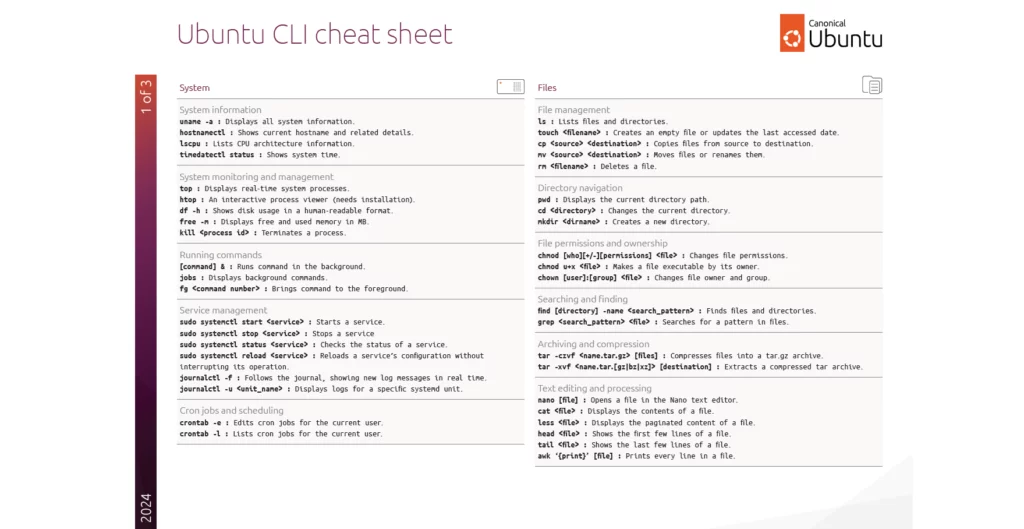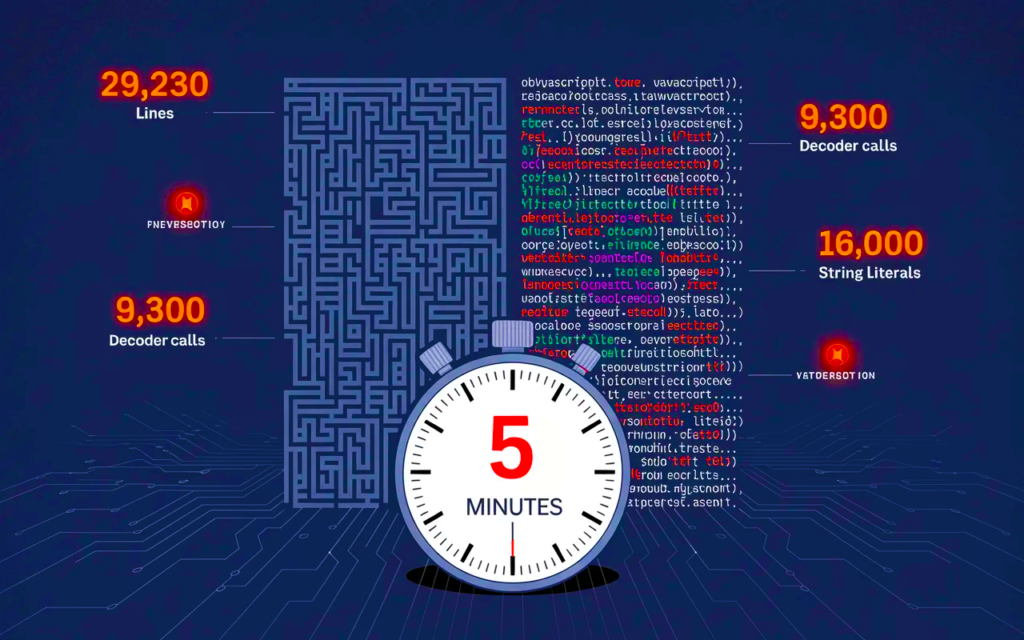The Ubuntu Command Line Interface (CLI) is a powerful tool that enables users to manage systems efficiently and securely. From system monitoring to package management and networking, the CLI provides a robust set of commands to perform various tasks. Here’s an overview of fundamental commands for 2024, designed to help you harness the full potential of your Ubuntu system.
For the complete set of commands, refer to the Ubuntu CLI documentation by Canonical, the creators of Ubuntu.
This cheat sheet is credited to Canonical and is based on their latest CLI guidelines for 2024.
uname -a : Displays all system information.
hostnamectl : Shows current hostname and related details.
Iscpu : Lists CPU architecture information.
timedatectl status : Shows system time.
System monitoring and management
top : Displays real-time system processes.
htop : An interactive process viewer (needs installation).
df -h : Shows disk usage in a human-readable format.
free -m : Displays free and used memory in MB.
kill <process id> : Terminates a process.
[command] & : Runs command in the background.
jobs : Displays background commands.
fg <command numbers : Brings command to the foreground.
sudo systemctl start «services : Starts a service.
sudo systemctl stop «services : Stops a service
sudo systemctl status «services : Checks the status of a service.
sudo systemctl reload «services : Reloads a service’s configuration without interrupting its operation.
journalcti -f : Follows the journal, showing new log messages in real time,
journalcti -u «unit_names : Displays logs for a specific systemd unit.
crontab -e : Edits cron jobs for the current user.
crontab -I : Lists cron jobs for the current user.
Is : Lists files and directories.
touch «filenames : Creates an empty file or updates the last accessed date
cp «sources «destinations : Copies files from source to destination.
mv «sources «destinations : Moves files or renames them.
rm «filenames : Deletes a file.
pwd : Displays the current directory path.
cd «directorys : Changes the current directory.
mkdir «dirnames : Creates a new directory.
File permissions and ownership
chmod [who][+/-][permissions] «files : Changes file permissions.
chmod u+x «files : Makes a file executable by its owner.
chown [user]:[group] «files : Changes file owner and group.
find [directory] -name «search_patterns : Finds files and directories.
grep «search_patterns «files : Searches for a pattern in files.
tar -czvf <name.tar.gzs [files] : Compresses files into a tar.gz archive.
tar -xvf <name.tar.[gz|bz|xz]s [destination] : Extracts a compressed tar archive.
nano [file] : Opens a file in the Nano text editor.
cat «files : Displays the contents of a file.
less «files : Displays the paginated content of a file.
head «files : Shows the first few lines of a file.
tail «files : Shows the last few lines of a file.
awk ‘{print}’ [file] : Prints every line in a file.
sudo apt install. <package> : Installs a package.
sudo apt install -f -reinstall <package> : Reinstalls a broken package.
apt search <package> : Searches for APT packages.
apt-cache policy <package> : Lists available package versions.
sudo apt update : Updates package lists.
sudo apt upgrade : Upgrades all upgradable packages.
sudo apt remove <package> : Removes a package.
sudo apt purge <package> : Removes a package and all its configuration files.
snap find <package> : Search for Snap packages.
sudo snap install <snap_name> : Installs a Snap package.
sudo snap remove <snap_name> : Removes a Snap package.
sudo snap refresh : Updates all installed Snap packages.
snap list : Lists all installed Snap packages.
snap info <snap_name> : Displays information about a Snap package.
w : Shows which users are logged in.
sudo adduser <username> : Creates a new user.
sudo deluser <username> : Deletes a user.
sudo passwd <username> : Sets or changes the password for a user.
su <username> : Switches user.
sudo passwd -I <username> : Locks a user account.
sudo passwd -u <username> : Unlocks a user password.
Sudo change <username> : Sets user password expiration date.
id [username] : Displays user and group IDs.
groups [username] : Shows the groups a user belongs to.
sudo addgroup <groupname> : Creates a new group.
sudo delgroup <groupname> : Deletes a group.
ip addr show : Displays network interfaces and IP addresses.
ip -s link : Shows network statistics.
ss -I : Shows listening sockets.
ping <host> : Pings a host and outputs results.
Netplan COnFiguration (read more at netplan.io)
cat /etc/netplan/*.yaml : Displays the current Netplan configuration
sudo netplan try : Tests a new configuration for a set period of time
sudo netplan apply : Applies the current Netplan configuration.
sudo ufw status : Displays the status of the firewall.
sudo ufw enable : Enables the firewall.
sudo ufw disable : Disables the firewall.
sudo ufw allow <port/service> : Allows traffic on a specific port or service.
sudo ufw deny <port/service> : Denies traffic on a specific port or service.
sudo ufw delete allow/deny <port/service> : Deletes an existing rule.
ssh <user@host> : Connects to a remote host via SSH.
scp <source> <user@host>:<destination> : Securely copies files between hosts.
sudo ufw status : Displays the status of the firewall.
sudo ufw enable : Enables the firewall.
sudo ufw disable : Disables the firewall.
sudo ufw allow <port/service> : Allows traffic on a specific port or service
sudo ufw deny <port/service> : Denies traffic on a specific port or service.
sudo ufw delete allow/deny <port/service> : Deletes an existing rule.
ssh <user@host> : Connects to a remote host via SSH.
scp <source> <user@host>:<destination> : Securely copies files between hosts.
LXD is a modern, secure and powerful tool that provides a unified experience for running and managing containers or virtual machines. Visit https ://canonical.com/lxd for more information.
lxd init : initializes LXD before first use
lxc init ubuntu:22.04 <container name> : Creates a lxc system container (without starting it).
lxc launch ubuntu:24.04 <container name> : Creates and starts a lxc system container.
lxc launch ubuntu:22.04 <vm name> –vm : Creates and starts a virtual machine.
lxc list : Lists instances.
lxc info <instance> : Shows status information about an instance.
lxc start <instance> : Starts an instance.
lxc stop <instance> [–force] : Stops an instance.
lxc delete <instance> [–force|–interactive] : Deletes an instance.
lxc exec <instance> — <command> : Runs a command inside an instance.
lxc exec <instance> — bash : Gets shell access to an instance (if bash is installed).
lxc console <instance> [flags] : Gets console access to an instance.
lxc file pull <instance>/<instance_filepath> <local_filepath> : Pulls a file from an instance.
lxc file pull <local_filepath> <instance>/<instance_filepath> : Pushes a file to an instance.
lxc project create <project> [–config <option>] : Creates a project.
lxc project set <project> <option> : Configures a project.
lxc project switch <project> : Switches to a project.
Ubuntu Pro delivers 10 years of expanded security coverage on top of Ubuntu’s Long Term Support (LTS) commitment in addition to management and compliance tooling.
Visit https://ubuntu.com/pro to register for free on up to five machines.
sudo pro attach <token> : Attaches your machine to Ubuntu Pro using a specific token. This token is provided when you subscribe to Ubuntu Pro.
sudo pro status : Displays the status of all Ubuntu Pro services.
sudo pro enable <service> : Enables a specific Ubuntu Pro service, like ESM, FIPS, or Livepatch.
sudo pro disable <service> : Disables a specific Ubuntu Pro service.
Extended Security Maintenance (ESM)
sudo pro enable esm-infra : Activates Extended Security Maintenance for infrastructure packages, providing security updates beyond the standard release cycle.
sudo pro enable esm-apps : Activates ESM for applications, extending security coverage for specific applications.
sudo pro enable livepatch : Enables the Livepatch service, which applies critical kernel patches without rebooting.
sudo pro enable fips : Enables FIPS (Federal Information Processing Standards) mode, enforcing strict cryptographic standards and practices.
sudo pro refresh : Refreshes the Ubuntu Pro state to ensure the latest configuration and services are in place.
sudo pro detach : Detaches the machine from Ubuntu Pro, disabling all services.








